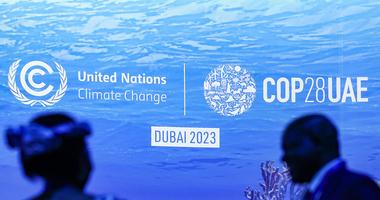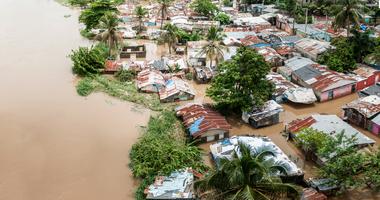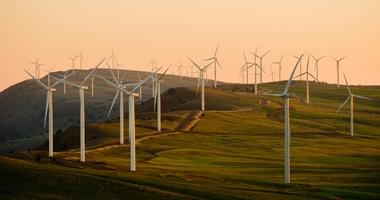
Marching for Climate Justice in Puerto Rico
5 min read
By Taína Colón
“Las playas, las playas son del pueblo, la playa no se vende.”
Every time I step off the plane at Luis Muñoz Marín Aeropuerto in Puerto Rico, I am immediately greeted by the sweet smell of tropical air and the harmonized chorus of the beloved coquí frog.
This time was no different, except I was not in Puerto Rico to visit distant family or spend the week drinking jugo de parcha on a tropical beach. I was here to support El Puente Puerto Rico, a non-profit climate justice organization based in San Juan, as part of my position as the scholarships and grants associate at The Climate Reality Project. This work commitment came about as part of an on-going partnership between The Climate Reality Project and El Puente Puerto Rico, which is one of our 2023 Climate Justice for All grants recipients.
I attended El Puente’s annual Caminata Puerto Rico ante el Cambio Climático, translated as "Puerto Rico's March Against Climate Change," an annual event where individuals and communities come together to raise awareness about the climate crisis. During the walk, participants advocated for environmental conservation, sustainable practices, and climate action, emphasizing the urgency of addressing climate-related and economic challenges on the island.
The event itself was incredible – over 700 people marched together in solidarity, starting at the historic Luis Muñoz Rivera Park. Through the procession, there were people singing, dancing, chanting, and even a live band playing traditional salsa music. As we marched, I couldn't help but notice that the vast majority of attendees were high school and college students – not much younger than myself, but they marched with the grace and wisdom of a generation that has been fighting for climate justice since childhood. We wove through the city streets, past boarded up shops – closed due to destruction from Hurricane María and a poor economy – and through a major avenue of the capitol city, before heading back to our starting point.
As we concluded the march, the crowd dispersed to celebrate, and I had the chance to hear more stories from locals about what called them to action. The most resounding call to action came after Hurricane Maria – the most defining example of the effects of climate change on the island.
Climate change has been particularly devastating for the small Caribbean island and its people. Hurricane Maria swept through Puerto Rico in September of 2017 and “...[brought] as much rainfall in one day as the island usually sees in three months.” It was the most devastating hurricane in Puerto Rico’s history, costing the island an esimated $139 billion as it struggles to recover from all the damage.
During my own stay I experienced severe flooding caused by an aguacero, which was a fitting parallel as a Nuyorican that survived Hurricane Sandy in New York and has faced in recent times many instances of severe flooding through the streets and subway stations exacerbated by rising sea levels due to climate change. At times, it truly feels like I have one foot in Puerto Rico and one foot in New York – both culturally and environmentally.
Not only has climate change been devastating to Puerto Rico, but the ongoing fight for political rights as a modern-day colony has also greatly affected the population. The economic damage has taken its toll on the island and one cannot forget the emotional toll from nearly 3,000 dead and another estimated 135,000 residents that permanently moved to the mainland as climate refugees. This loss of population has largely been seen among young adults and families seeking better economic opportunities and safety for their young children. This phenomenon is also sometimes known as “brain drain,” meaning that the island is losing its talent and young workforce, perpetuating a vicious cycle of economic downturn.
The fight for justice is reflected in our peoples' song and dance through lyrics and movements of resistance. The traditional Afro-Indigenous music plena were enjoyed in a live session after the Caminata with an original song and chant, “Las playas, las playas son del pueblo, la playa no se vende,” roughly translating to “the beaches, the beaches are ours, the beach is not for sale.” This song and call chant reflects the modern-day struggle Puerto Ricans are facing from gentrification by wealthy Americans and private companies attempting to build on public beaches, and the fight to keep Indigenous practices alive. In Puerto Rico, nature is legally and culturally recognized as being for all people, meaning anyone can access the beach and there are no private beaches.
At the Caminata, one organization in particular recounted several environmental crimes – the most prominent in recent news being an incident in Rincón, Puerto Rico, an area known for its population of endangered sea turtles. After Hurricane Maria, an illegal wall was constructed by Sol y Playa condominium as an attempt to build on the coastline on Los Almendros beach in Rincón. In July of 2022, locals and climate activists protested the privatization of public beaches and the development of luxury condos by wealthy investors on protected coastline by forcefully demolishing the construction that had started on the beach.
Now more than ever, it is important for young Puerto Ricans to learn and take action for a better climate future as a way to protect their native land. The Caminata was one part of a greater effort to advocate for change and awareness of the climate crisis.
Unfortunately, there was little media coverage by the top Puerto Rican news outlets and most recognition came from small independent newspapers. Despite the lack of coverage, this event once again brought together the community after being suspended for three years due to the COVID-19 pandemic with an impressive turn-out. Time will tell, but hopefully these demonstrations will continue to show the Puerto Rican and federal government that the pueblo is here to stay and fight for climate justice.
I went on this trip for work purposes, but it ultimately made me even more proud to be Puerto Rican and to continue to preserve my culture by speaking my family’s language, connecting with my elders, and fighting for justice for my ancestral home.




